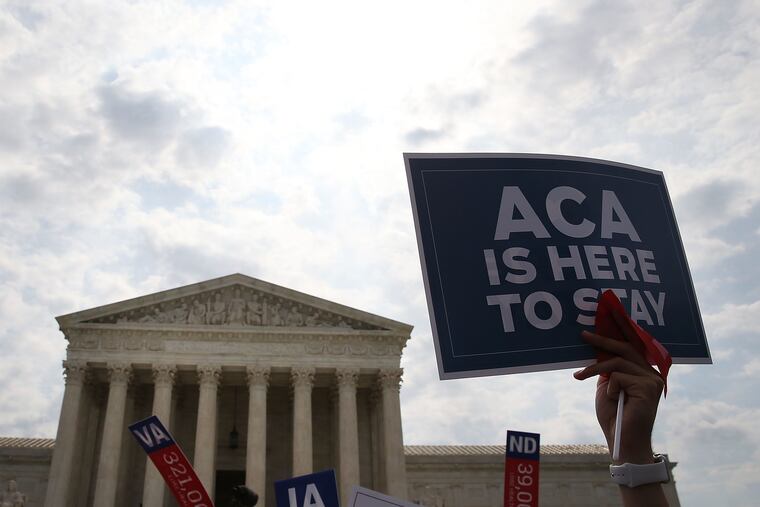Overturning the Affordable Care Act would harm young adults with cancer especially, study suggests
The study heightens concern that upcoming Supreme Court rulings could lead to the act being dismantled.

For young adults with cancer, adhering to treatment plans has long been a challenge for a lot of reasons. But passage of the Affordable Care Act, which expanded coverage to millions, suggests insurance, not unwillingness to return for care, remains the biggest barrier.
A new study suggests young adults with cancer who are protected under the ACA’s dependent coverage provision were more likely to remain on private insurance longer than patients who were not offered the same protections. The ACA requires that employer-based health plans offer coverage to the children of workers until age 26.
It might seem apparent that if people have access to health insurance, they’re more likely to be covered. But the researchers wanted to test that for multiple reasons, including the fact that some argue that the ACA has actually made insurance less affordable to people.
The study, published late last month in JCO Oncology Practice by researchers at Children’s Hospital of Philadelphia and the University of San Francisco Benioff Children’s Hospitals, heightens concern about upcoming Supreme Court rulings that could overturn part or all of the ACA. The Supreme Court will hear oral arguments on Nov. 10.
“In an ideal world, all patients would have continuous health coverage that was recommended by doctors and their medical team,” said Lena Winestone, lead author of the paper and an assistant professor in pediatrics at UCSF. “The ACA is one solution to the problem that our patients are not getting necessary care in the health system that we currently have in place. Because of the Supreme Court case, it’s possible that even really popular components of the ACA, like the dependent coverage provision, are at risk.”
» READ MORE: ‘Ask me why I don’t have nipples’: How young adults disclose their cancer status to dates and employers
Winestone said the study focused on young people with cancer because that age group has been identified by the National Cancer Institute to be particularly vulnerable. And even though cancer survivors need medical care more often than people without cancer, they deal with increased issues of access and affordability.
To quantify the impact of the ACA’s dependent coverage provision, researchers selected patients who were born in 1982 or later, and who were diagnosed between Jan. 1, 2000, and Oct. 1, 2015, with the most common types of cancers among adolescent patients. These include Hodgkin lymphoma, acute myeloid leukemia, and thyroid cancer. The patients were split into two cohorts. The older group were not protected by the ACA when they turned 19 or graduated college, when health plans were previously allowed to remove adult children from their parents' coverage. The younger group were protected by the ACA. The patients in the older cohort were then matched to ones in the younger group based on similar cancer diagnosis dates.
Younger patients stayed enrolled on an insurance plan for longer on average — 26 months from time of diagnosis, compared with 22 months for patients with similar diagnoses and treatment characteristics who were not covered under the dependent care clause. Younger patients were also more likely to retain insurance coverage over four years, compared with older patients — 37% vs. 31%.
Winestone said insurance coverage is particularly important for young people with cancer, as it’s easy for them to “fall through the cracks between pediatricians and adult doctors.”
“Particularly for oncology, it’s essential for patients to get the care that they need,” Winestone said.
» READ MORE: As children, they survived cancer. They faced the fallout as adults.
Insurance is also important for cancer survivors because they are often affected by chronic medical conditions, researchers said. Patients with cancer and survivors experience trouble getting affordable health insurance because of ongoing disability as well as loss of work and income. Younger cancer survivors are also more likely to report financial hardship from changed employment because of cancer.
Previous studies have shown that the ACA has led to an improved uptake of private insurance among young people, with more than 3 million young adults gaining health insurance coverage.
“As a physician, I frequently see barriers to care as a result of either lack of insurance, underinsurance, or disruptions in insurance,” said Winestone. “It’s heartbreaking when that happens, and the patient does not get the care they deserve.”